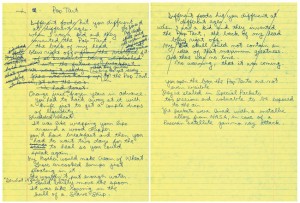The spy novelist John Le Carre, one of my favorites, describes conflict in his books this way. After creating a character, the next step is:
... empathy, fear and dramatization. I have to put him into conflict with something, and that conflict usually comes from within. They’re usually people who are torn in some way between personal and institutional loyalty. Then there’s external conflict. “The cat sat on the mat” is not the beginning of a story, but “the cat sat on the dog’s mat” is.Is this a useful technique for those who write about business, technology and the economy? Yes, absolutely.
What is a market, after all, but a contest between a buyer and a seller? What is protectionism in trade all about? What happens to the old ways when a new workplace technology comes along?
What is at play in your subject? Who wins, who loses?
I decided to do a random check of my thesis. Lo and behold, the very first article I turned to is full of conflict. It's a seemingly boring subject, managing working capital -- I know, yawn -- but look what writers do with it. This is from McKinsey:
Managing a company’s working capital isn’t the sexiest task. It’s often painstakingly technical. It’s hard to know how well a company is doing, even relative to peers; published financial data are too high level for precise benchmarking. And because working capital doesn’t appear on the income statement, it doesn’t directly affect earnings or operating profit—the measures that most commonly influence compensation. Although working capital management has long been a business-school staple, our research shows that performance is surprisingly variable, even among companies in the same industry.
That's quite a missed opportunity.There is a lot of conflict -- dis-ease -- in this opening graf. The first line of the second graf just piles on the discomfort. (The writers use another smart technique: acknowledging that the subject is boring, to, they hope, mitigate it.)
If someone can do this with working capital, certainly you can do it with your topic. Just explore it for its inherent conflict. Let the reader get caught up in the drama.







